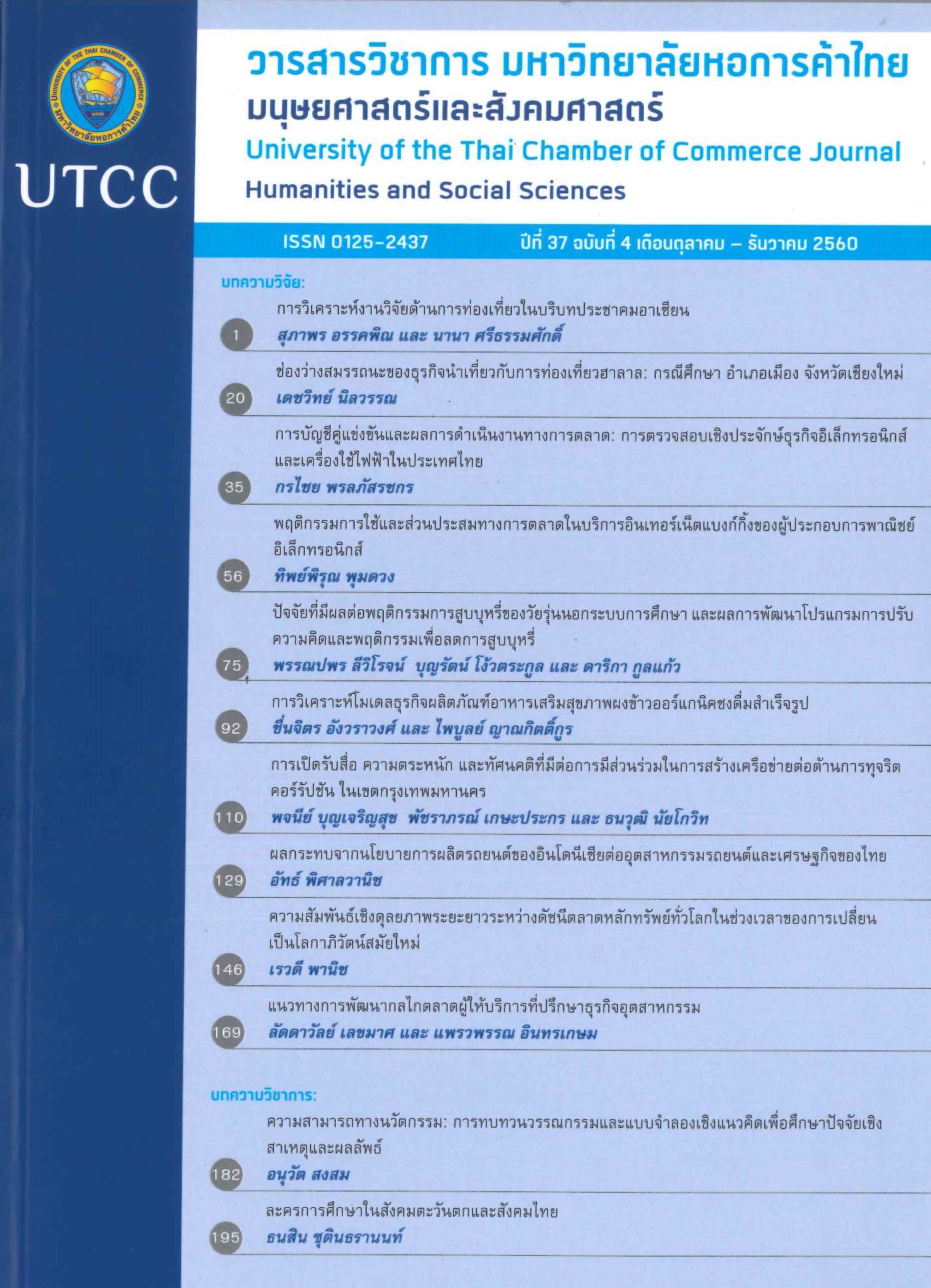The Roles of Media Exposure, Awareness, and Attitude on Anti-Corruption Network Participation in Bangkok Metropolitan
Main Article Content
Abstract
This research aims to examine the relationship among media exposure, awareness, and attitude related to anti-corruption initiatives and to predict how the awareness and attitude influence the participation in an anti-corruption network, the Anti-Corruption Organization of Thailand (ACT). Questionnaires were administered to 400 respondents who are participate in the ACT. Obtained data were analyzed using Multivariate Analysis of Variance (MANOVA), Pearson Correlation Coefficient, and Multiple Regression. The results are as follows: 1) Participants with differences in age, occupation, affiliated organizations, and income have significant differences in awareness and attitude toward anti-corruption initiatives. 2) Media exposure to television commercials about anti-corruption in general and TV spot “Never Let the Corrupt Take a Stand in Society” are positively correlated with awareness on anti-corruption initiatives. 3) Media exposure to television commercials about anti-corruption in general are significantly positively correlated with attitude toward anti-corruption initiatives, and exposure to TV spot “Never Let the Corrupt Take a Stand in Society” are significantly positively correlated with attitude toward anti-corruption initiatives in disclosure and cultivation. 4) Awareness of anti-corruption initiatives are positively correlated withattitude toward anti-corruption initiatives. 5) Awareness of and attitude toward anti-corruption may significantly predict the participation in anti-corruption network of ACT at the levels of information reception and dissemination, planning cooperation, and partnership.
Article Details
ลิขสิทธิ์ของบทความ
ผลงานที่ได้รับการตีพิมพ์ถือเป็นลิขสิทธิ์ของมหาวิทยาลัยหอการค้าไทย ห้ามมิให้นำเนื้อหา ทัศนะ หรือข้อคิดเห็นใด ๆ ของผลงานไปทำซ้ำ ดัดแปลง หรือเผยแพร่ ไม่ว่าทั้งหมดหรือบางส่วนโดยไม่ได้รับอนุญาตเป็นลายลักษณ์อักษรจากมหาวิทยาลัยหอการค้าไทยก่อน
References
Chutavichit, K. (1997). Communication in rural development. Nakhon Pathom, Thailand: Petchkasem Printing. (in Thai).
Intharit, B. (2008). Effects of corruption on Thailand’s economic growth (Unpublished master’s thesis). Kasetsart University, Bangkok, Thailand. (in Thai).
Kaewthep, K. (2014). Mass communication theory (4th ed.). Bangkok, Thailand: Parbpim. (in Thai).
Kanpai, K. (2000). Community communication: Key concepts for development. Journal of Communication Arts, 18, 61-78. (in Thai).
Ngamkhum, W. (2007). Communication strategy “To quit alcohol and stop violence to the family”: A project of Thai Health Promotion Foundation and perception of an alcoholic
to reduce incident of domestic violence: The study of Thai Kriang community. (Unpublished master’s thesis). Thammasat University, Bangkok, Thailand. (in Thai).
Nimitmongkol, M. (2014, February 12). AntiCorruption Organization in a nutshell: Interview with anti-corruption campaigner. ASTV Manager, p. 16. (in Thai).
Nimitmongkol, M. (2017). Corruption situation index (CSI) press conference. Retrieved August 28, 2017, from www.anticorruption.in.th/2016/th/detail/480/1/การแถลงรายงานผลสำรวจดัชนีสถานการณ์คอร์รัปชันไทย (in Thai)
Nontanakorn, D. (2011, May 21). Chamber of Commerce - The Federation of Thai Industry against corruption, gave up to be givers, fed up with under-the-table jumps 50%. 21 organizations joined force to show a standpoint. Matichon, p. 1, 16. (in Thai).
Padungchewit, J. (2012). Participatory communication for balance and sustainability. Retrieved August 28, 2017, from https://cse.nida.ac.th/main/images/ParticipatoryCommunication ForBalanceAndSustainability.pdf (in Thai).
Piriyarangsan, S., & Phongpaichit, P. (1994). Corruption and democracy. Bangkok,Thailand: Chulalongkorn University,Faculty of Economics. (in Thai).
Pongpaitoon, D. (2001). Information exposure,knowledge and attitude toward sex education of teenagers in Bangkok (Unpublished master’s thesis). Chulalongkorn University, Thailand.
(in Thai).
Sothanasatien, S. (1990). Social communication. Bangkok, Thailand: Chulalongkorn University. (in Thai).
Sripun, Atchara. (2012). Participatory communication strategy for creative economy development in Thailand. MISJ Journal of Naresuan University, 7(1): 5-19. (in Thai).
Suebsureekul K. (2001). Relationship among media exposure, knowledge, attitude and participation regarding air pollution reduction campaign: Study of car users
in Bangkok Metropolitan Administration (Unpublished master’s thesis). Bangkok University, Thailand. (in Thai).
Surasonthi, K. (1990). Introduction to communication (2nd ed.). Bangkok, Thailand: Thammasat University, Falculty of Journalism and Mass Communiction. (in Thai).
Suthiwong, P. (2016). Pramon Suthiwong reveals best corruption situation in Thailand in 6 years, the government has helped suppresses. Retrieved March
14, 2017, from https://prachatai.com/journal/2016/07/67133 (in Thai).
Thi-in, P. (2010). Media use in anti-corruption campaign of office of the national anticorruption commission during the year 1999-2000. Bangkok, Thailand:Chulalongkorn University.
(in Thai).
Tipmanosing, K. (2010). The right of people to participate in the process of public policy. University of the Thai Chamber of Commerce Journal, 30(4), 160-175. (in Thai).
Vijit-vadakan, J. (2010, October 19). Associate Professor Doctor Juree Vijit-vadakan teach your children not to cheat. Kom Chad Luek, p. 10. (in Thai).
Wongvanitchakij, P. (2007). A study on media exposure and costumers’ knowledge,attitude, and behavior in using hotel services in Bangkok (Unpublished master’s thesis). Bangkok University,Thailand. (in Thai).

